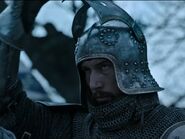| This article's content is marked as Mature The page contains mature content that may include coarse language, sexual references, and/or graphic violent images which may be disturbing to some. Mature pages are recommended for those who are 18 years of age and older. If you are 18 years or older or are comfortable with graphic material, you are free to view this page. Otherwise, you should close this page and view another page. |
| “ | Oh, you feel yourself guilty. Oh, but my love, I beseech you, tell no one. For your own safety. If your husband hears of this, he may kill you. Say nothing. Do not feel badly, my love. We could not help ourselves. | „ |
| ~ Jacques le Gris to Marguerite de Carrouges after he rapes her. |
| “ | If you run, I will only chase you. | „ |
| ~ Jacques to Marguerite before raping her. |
| “ | In the name of God and on the peril of damnation of my soul, I am innocent of the crime! | „ |
| ~ Jacques le Gris' last words before his gruesome death. |
Sir Jacques le Gris is the main antagonist of Ridley Scott's 2021 film The Last Duel, based on Eric Jager's 2004 book The Last Duel: A True Story of Trial by Combat in Medieval France. He is based on a real individual who lived in France in the 14th Century.
He was portrayed by Adam Driver, who also portrayed Kylo Ren in the Star Wars sequel trilogy and Henry McHenry in Annette.
Personality[]
Jacques le Gris, having been born with neither name nor wealth, had to work his way up in the world. He studied, becoming literate and skilled in arithmetic and spoke several languages. He greatly valued his friendship with Jean de Carrouges, standing as godfather to his son and urging him not to needlessly risk his life. He also defended him from the scorn of their liege lord, Count Pierre d'Alençon. Even after their falling out, he still held Carrouges in high regard, being quick to praise him and tolerant of his short temper.
Le Gris was a womanizer, often engaging in orgies with Pierre. However, this gave him a very warped view of sexual relationships, believing that every woman wished to sleep with him. He believed that he and Marguerite de Carrouges were in love after meeting only once, leading to him believing that his rape of her was in fact consensual and he was shocked and horrified to learn of her accusation against him. He was so adamant in his belief that it was adultery rather than rape that he denied it even up to the moment of his death.
Biography[]
Jacques le Gris is born into a humble background. He trains to be a priest, but does not find the requirements desirable. He meets and befriends Jean de Carrouges, eventually being named godfather to his son, though the boy and his mother later die of the plague. On the orders of their liege lord, Count Pierre d'Alençon, the two men fight alongside each other in the Battle of Limoges on 19 September 1370, with both later claiming to have saved the other's life in the conflict. They ultimately lose the battle and are forced to abandon their campaign.
In 1377, the two friends travel to Fort Bellême, where Carrouges' father, Jean de Carrouges III, is the captain. Along with several others, they swear to serve Pierre for life, with the count favoring le Gris and being dismissive of Carrouges.
Le Gris meets with Pierre at Argentan and speaks up for Carrouges, declaring that while he has many negative qualities, he is a good friend and a loyal soldier. Pierre finds Carrouges to be boring, gloomy and disobedient, but grants le Gris free will to do as he likes. The count tells the squire that he thinks little of Carrouges' character but a great deal of his and warns him not to be blinded by his loyalty to his friend.
In the service of the count, Le Gris engages in a variety of decadent activities. He showcases his intellect to those present by reading several ribald Latin texts aloud. Once Pierre's pregnant wife, Lady Marie Chamaillart, retires to her bedchamber for the night, the two men take part in an orgy with several women, with le Gris playfully chasing a young woman around the room and warning that if she runs, he will only chase her. The next morning, Pierre confides in le Gris that his accounts are in disarray and asks the squire to put his intelligence to good use as his personal accountant and debt collector.
Travelling to the home of the disgraced lord Robert de Thibouville, le Gris orders two soldiers accompanying him to beat one of Robert's servants in order to intimidate the lord. He informs him that Pierre is demanding that he give him Aunou-le-Faucon. Robert refuses, as it is one of his most valuable estates, is intended to be part of his daughter Marguerite's dowry and is worth twice the amount that he owes Pierre. Le Gris suggest that he think of how good it will feel to be completely without debt and takes the estate by force.
He later visits Carrouges, informing his friend that he has come to collect a debt that Pierre is owed. He takes no pleasure in it, having visited all of the other vassals before him. Carrouges takes offence, seeing it as an affront to his loyal service. Le Gris calms him down by promising to speak with Pierre and inform him of the difficulties that the plague has placed on Carrouges' estate. Carrouges is grateful and agrees to give le Gris an affordable payment so that he does not return to their lord empty-handed.
In 1380, le Gris and Carrouges fight to repel an invasion of Normandy by the English. Le Gris warns his friend not to rush recklessly into battle, as he has no heir and if he dies, his great and storied name will die out and all of his property will revert to Count Pierre. Carrouges informs le Gris that he is fighting in the campaign for financial gain, as he is broke.
On a hunt with Pierre, le Gris is informed to the count that Carrouges has marrid Robert's daughter Marguerite. Pierre finds it amusing that Carrouges would marry the daughter of a traitor who fought against the crown twice in the past. Le Gris explains that Carrouges is in need of an heir and money. He soon learns that Carrouges is suing him and Pierre for ownership of Aunou-le-Faucon, which Pierre gifted to le Gris as a reward for his loyal service and which Carrouges believed he would recieve as part of Marguerite's dowry.
Despite le Gris' warning that Carrouges will be furious, Pierre names le Gris as the new captain of Fort Bellême following the death of Carrouges' father. A ceremony is held in which le Gris makes a vow to protect the fortress and command its garrison to the best of his ability. Carrouges arrives immediately afterwards and makes his greivances known. Le Gris attempts to calm him and speak to him in private, but Carrouges angrily calls the count's subjects, including le Gris, sycophants. He threatens to sue Pierre for this and storms off angrily to laughter and jeers, while le Gris watches him with pity.
Le Gris is invited to the home of Jean Crespin to celebrate the birth of his son. Knowing that Jean de Carrouges will be present, he wishes to make amends with him. At the event, he flirts with a young noblewoman named Elizabeth, who tells him that she has heard all about him from the ladies at court. His comrade, Adam Louvel, alerts him to Carrouges' arrival. A few tense seconds pass between the two men before they warmly greet each other and agree to put their past animosity behind them and serve their king together. As a show of good faith, Carrouges orders Marguerite to kiss le Gris, which she reluctantly does. Le Gris becomes fixated on her and approaches her afterwards, where they converse in German and discuss works of literature. He compliments her on her beauty and intelligence and Louvel warns him that it is a sin to covet another man's wife, to which le Gris replies her that is no less sinful that her coveting him.
As time passes, le Gris becomes increasingly obessessed with Marguerite, watching her from afar and having dreams in which she seduces him. He attends a feast with Pierre and his subjects, during which Carrouges returns from a campaign in Scotland. He admits that the campaign was a failure, but le Gris attempts to comfort his friend by stating that he does not believe the failure was due to his leadership. Carrouges, who is now a knight, takes offence that le Gris does not call him "Sir". Le Gris insists that he did not intend to offend him, but Carrouges rants about le Gris' continued success at court in contrast to his failures on the battlefield. Le Gris agrees to call him "Sir" and wishes him an enjoyable stay in Paris, where he intends to meet with the treasurer.
In January 1386 while Carrouges is in Paris, le Gris and Louvel travel to Capomesnil. Carrouges' mother, Dame Nicole, has taken all of her servants with her on an errand, leaving Marguerite alone at the estate. As le Gris hides nearby, Louvel converses with Marguerite through the door, claiming that he his has thrown a shoe and asking if he can come inside for warmth while he is reshod. She grants his request, at which point le Gris sneaks inside. He kneels before Marguerite, declaring that he loves her and would do anything for her. She is appalled by his statement and he orders Louvel to leave. Once Louvel is gone, le Gris continues to pursue Marguerite, expressing sympathy to her for being trapped in a loveless marriage and declaring that he knows she loves him too.
She orders him to leave and walks away, but he follows her up the stairs and corners her in a bedchamber. She cries out for help and he tells her that if she runs he will only chase her, as he told the young woman at Pierre's orgy. Blocking her exit, he lifts her up and carries her to the bed. As she struggles against him, cries and pleads for him to stop, he pins her down and rapes her. Once he ejaculates, he warns her not to tell anyone what has occured, as her husband may kill her if he finds out. Before he leaves, he tells her that she should not feel guilty, as they could not help themselves. He later goes to a priest and confesses to having commited the sin of adultery.
Le Gris is called before Pierre, who informs him that Carrouges and those close to him are accusing him of raping Marguerite. Le Gris is shocked to hear this, declaring the accusation to be false. He tells Pierre that it is a love unlike anything he has ever known and that being a lady, Marguerite made the customary protests, but it was not against her will. He admits to committing adultery, but vehemently denies the rape. Pierre believes him and advises him to deny the charge at any opportunity, as commoners are too unintelligent to understand nuance and he should therefore make no other attempts to clear his name. As promised, Pierre holds a trial in which he declares le Gris to be innocent. Immediately afterwards, a messenger arrives and informs him that Carrouges has gone to Paris to appeal to the king to bring the case before him.
Le Gris meets with his lawyer, Jean le Coq, who advises him to seek trial by the church, which he is entitled to as a cleric in minor orders, to escape the jurisdiction of the secular courts. Le Gris asks how he may clear his name. Le Coq asks him if there was an affair, which le Gris denies. Le Coq makes his doubts clear, wondering why Marguerite would lie and put her life at risk, as the penalty for bearing false witness is death. Determined to clear his name and not wishing to be seen as a coward, le Gris rejects le Coq's suggestion.
Le Gris and Carrouges are called to the Palace of Justice to give testimony before King Charles VI and the Parlement of Paris. Carrouges accuses le Gris of carnally and feloniously taking his wife againts her will in their home on the third week of the past January. He declares that if le Gris denies the charge, he is ready to face him in a trial by combat, throwing down a gauntlet. Le Gris gives his testimony, denying the accusations against him and accusing Carrouges of lying and defaming him. Vowing to do whatever is necessary to clear his name, le Gris accepts Carrouges' challenge, picking up the gauntlet and swishing his cape around dramatically. King Charles announces that the verdict will be reached in a fortnight and that if either man attempts to flee the city beforehand, it will be taken as proof of his guilt and he will be hanged.
Marguerite is questioned by le Coq and the Parlement, who attempt to damage her credibility. They reveal that they have received a statement from her friend Marie de Latour that she once declared le Gris to be handsome. They ask her questions about her pregnancy, as she has produced no children in her five years of marriage. Declaring that a woman cannot achieve orgasm from rape and that pregnancy is impossible unless a woman orgasms, they suggest that Marguerite cried rape to cover up an infidelity. Le Coq informs her of the horrible fate that awaits her if she is found guilty of bearing false witness, but she refuses to withdraw her accusation. King Charles announces that they will proceed with the duel. Shortly before the duel, le Gris is knighted to put him on equal social footing with Carrouges. On December 29, 1286, both men enter an arena at Saint-Martin-des-Champs.
They begin with a joust, coming to blows several times before le Gris kills Carrouges' horse by driving his lance into its chest. However, his horse loses its footing and sends him to the grpound. His leg now trapped under the weight of his horse, le Gris uses his shield to defend himself from Carrouges' attacks. Carrouges knocks the shield from his grip, leaving le Gris with only his hands to hold back Carrouges' axe. As le Gris' horse thrashes around, it kicks Carrouges in the head, knocking him off his feet. Once his horse gets back up, le Gris advances on Carrouges, relentlessly attacking him. Carrouges fights back, breaking le Gris' sword in two. He backs him into a wall and the two men visciously attack each other, with le Gris driving a dagger into Carrouge's thigh. Wounded and struggling to stay on foot, Carrouges charges at le Gris, who easily evades him. Knocking Carrouges to the ground, le Gris prepares to deliver the killing blow.
As he raises his dagger, Carrouges slams his axe into the back of le Gris' knee and tackles him to the ground. Straddling his enemy, Carrouges grabs le Gris' dagger and drives it towards his face, but le Gris grabs it and holds it at bay. As the two men struggle, Carrouges shouts at le Gris to confess. Le Gris denies the rape three times and shouts for all to hear that in the name of God and on the peril of damnation of his soul, he is innocent of the crime. Enraged, Carrouges declares that he will be damned and turns le Gris onto his side, still trying to push the dagger into his face. With a yell of fury, Carrouges slams his knee into the back of le Gris' head, driving the dagger into his mouth and killing him. As the victorious Carrouges rides through the streets of Paris to a cheering crowd, le Gris' body is stripped naked and dragged to the gibbet at Montfaucon, where it is hanged as a sign of his guilt and shame.
Gallery[]
Trivia[]
- Annette and The Last Duel came out on the same year in which Adam Driver started in.
- Ben Affleck was originally cast as Jacques le Gris, having written the character's perspective in film's Rashomon-like plot structure. However, due to a scheduling conflict with Deep Water, he was forced to instead take the less demanding role of Count Pierre d'Alençon.
- Adam Driver was 38 when he played Jacques le Gris, who was 56 at the time of his death.
- Though the film portrays Jacques le Gris as guilty of raping Marguerite de Carrouges, this was never definitively proven and the facts of the case remain a topic of heated debate to this day. It was due to the high likelihood of miscarriages of justice that the practice of trial by combat was outlawed and the duel between le Gris and Carrouges was the last one ever sanctioned in France.










